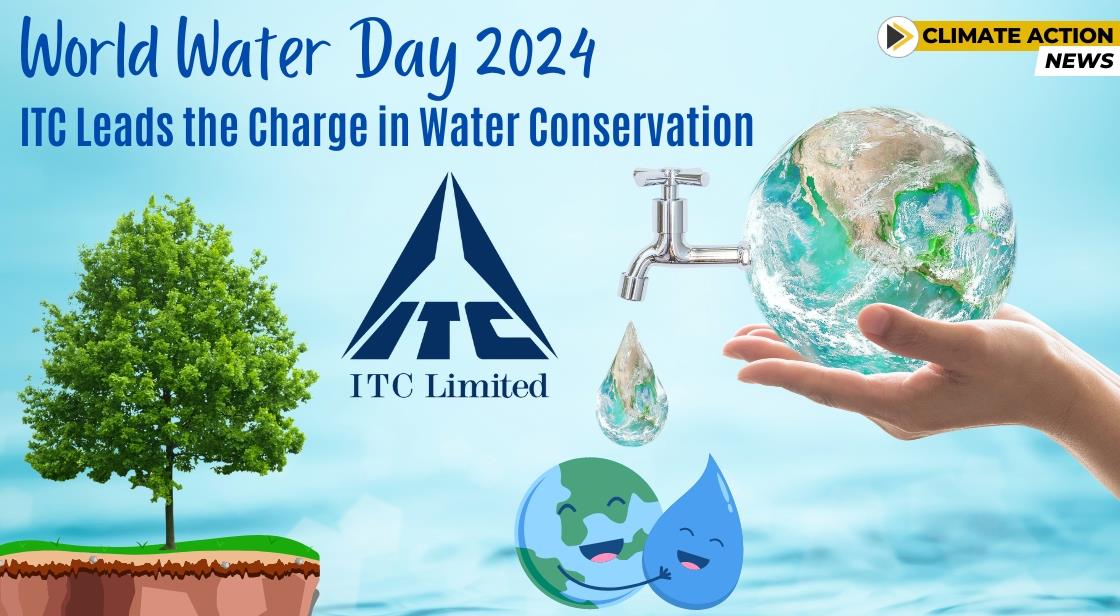World Water Day 2024: ITC Leads the Charge in Water Conservation

News Synopsis
As the impacts of unplanned urbanization exacerbate water scarcity issues in cities, the importance of water conservation initiatives becomes increasingly evident. On World Water Day 2024, the severity of India's water crisis is starkly highlighted, with cities facing extreme shortages and citizens enduring long queues for water tankers. In response to this pressing challenge, ITC, a multi-business conglomerate, has emerged as a leader in implementing comprehensive water stewardship programs.
India's Water Crisis: A Cause for Concern
-
Data-driven urgency: 54% of India faces high water stress, with nearly 600 million people at risk of disruptions in surface water supplies.
-
Daily struggles: Long queues for water tankers, exorbitant prices for water purchases, and swimming pool bans are a common sight in water-stressed cities.
ITC's Pioneering Water Stewardship Programs
In response to this crisis, ITC, a multi-business conglomerate, has emerged as a leader in water conservation. Their multifaceted approach has garnered international recognition.
-
Global recognition: ITC is one of only two Indian companies on the prestigious CDP Water A List, surpassing the Asian average and ranking among the top 101 global companies for water security.
-
Alliance for Water Stewardship (AWS) certification: Four ITC facilities have achieved the highest Platinum-Level AWS Certification.
ITC's Multi-pronged Approach to Water Stewardship
ITC's success hinges on a ten-point strategy encompassing various aspects of water management:
-
Wastewater treatment
-
River revitalization
-
Traditional water conservation structures
-
Community engagement
-
Precision climate-smart agriculture
-
Watershed development
-
Responsible water use
-
Sustainable luxury practices
-
Biodiversity management
-
Public-private partnerships
Water Efficiency Within ITC Facilities
The company prioritizes maximizing water use efficiency through the "3R" principle:
-
Recycle: Industrial wastewater is treated and recycled for use in administrative toilets.
-
Reuse: Water flow in nozzles is reduced to minimize waste.
-
Reduce: Rainwater collection systems are installed for sustainable water harvesting.
Beyond the Walls: Community Impact
ITC extends its efforts beyond its facilities through various initiatives:
-
River basin revival programs: Five such programs aim to achieve water-positive status in targeted areas. The Ghod River Basin serves as a success story, achieving water positivity within five years.
-
Traditional water conservation revival: Efforts focus on restoring local systems like Ahar Pynes (reservoirs), community tanks, and rainwater nallas (drains).
-
Water User Groups: ITC empowers communities by supporting grassroots institutions in forming Water User Groups, promoting collective water management.
-
Promoting water-efficient agricultural practices: Micro-irrigation, zero tillage, and other innovative techniques are encouraged for crops like paddy, sugarcane, and fruits.
Watershed Restoration and Sustainability
-
Focus on restoration: ITC prioritizes restoring watersheds near its facilities and in agricultural catchment areas.
-
Sustainable water management: Their program covers over 1.5 million acres and benefits over 440,000 people.
-
Water harvesting structures: Over 36,600 such structures have been built, creating a storage capacity exceeding 51.85 million kiloliters.
-
Sonesangvi village transformation: ITC's water stewardship initiatives have transformed this Maharashtra village from relying on purchased water to achieving self-sufficiency.
Responsible Luxury and Sustainable Practices
-
Zero-mile water: ITC Hotels demonstrate their commitment to sustainability by offering "Zero Mile" water under the SunyaAqua brand, purified through in-house bottling plants.
-
Atmospheric Water Generators (AWGs): The ITC Grand Chola hotel in Chennai utilizes AWGs to extract and purify water from atmospheric moisture, further reducing reliance on external sources.
Biodiversity Conservation and Public-Private Partnerships
-
Protecting natural ecosystems: ITC spearheads large-scale biodiversity conservation programs in catchment areas to preserve water-based ecosystems and ensure a sustainable future for local communities.
-
Public-private partnerships: ITC has established 46 Public-Private Partnerships to advance water stewardship efforts.
By implementing these multifaceted programs, ITC serves as a beacon of hope in the fight against water scarcity. Their innovative approach and commitment to community engagement provide a valuable model for others to follow.









